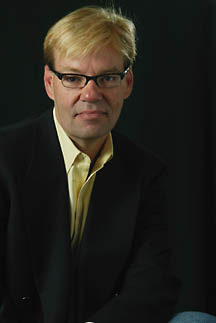Elora Festival making Sweet Music at 25 by Joseph So
/ June 5, 2004
 |
| Noel Edison | In those
distant days of 1979, an enthusiastic group of music lovers dared to dream of
starting an early music summer festival in the picturesque village of Elora,
Ontario. Included in
that group of pioneers was a young music student, Noel Edison. Now, 25 years
later, Edison is a respected choral director, conductor, and the artistic
director of the Elora Festival. Modeled after Tanglewood and Spoleto USA, it has
earned the enviable reputation as the place to go for summer choral music
in Ontario. Though its program is diverse, ranging from classics to folk, pop,
and world music, its main focus remains the classical voice. To celebrate its
silver jubilee, the festival promises its most ambitious program in years,
signifying a certain artistic coming of age. Here Edison reflects on the past
and contemplates the future.
LSM/TMS: Looking back over the last 25 years,
what are your most memorable moments?
NE: That's hard to pinpoint; there
were many artistically memorable moments. But I also quietly celebrate the
achievements we have made in the corporate and administrative support that have
to be in place to make any event a success. Signposts such as when we enjoyed a
concert in a new venue, like the Gambrel Barn--we've been there now for 15
years. We now have a solid following of patrons who are keen to experience new
works with us. Having a host of international artists every year is always a
good advancement, and so is the solidifying of the orchestra, with players from
the Toronto and Kitchener-Waterloo symphonies.
LSM/TMS: You are opening the season with
Beethoven's 9th--a monumental piece. And you are combining it with
Poulenc's Gloria.
NE: Beethoven's 9th is a
revolutionary work, one used in points of great occasion, a symphony that
celebrates life, humanity, and creativity--the summation of a festival.
Everybody knows the Ode to Joy. But my favourite is the third movement, the most
expressive and transforming part of the symphony. We open the season also on the
9th--of July! The nature of the festival is to have lots of sacred
music, and Beethoven's 9th is not a religious work as such. Gloria
is a great work--vibrant, extremely evocative, and loaded with instrumental
and vocal colours, a good contrast to the powerful symphony.
LSM/TMS: And a week later, you are bringing to
your audience the Verdi Requiem for the first time.
NE: It is one of my favourites; it is
a sacred opera. Despite it being a requiem, it is really a work of celebration.
My problem with it is that it has fallen into a tradition of excesses. Being
from a "lean, mean cuisine" school of music making, I tend to be tidier with the
piece, although that does not in any way inhibit its emotional and expressive
qualities. Any great work with such emotional impact as the Verdi
Requiem, it's right on the page. And if you have any soul, you just bring
it off the page and make it work.
LSM/TMS: What is the secret of the success of
the Elora Festival?
NE: A festival is a celebration of a
community, whether through music or dance, or theatre, or whatever. A festival
must have a sense of occasion about it, a sense of excellence, and a sense of
celebration. You package it as incredible entertainment, incredible
enlightenment, incredible affinity for understanding different kinds of music,
and a cleansing of the soul through the sound of music. With all those things in
mind, you program accordingly. I try to get a variety of things that complement
each other--presenting different acts, different eras of music, different
influences, different colours.
This festival celebrates the shedding of the winter
formalities. You can park on the streets, wander in and out of churches and
restaurants; it's intimate and personal. There is an immediacy about it--you
have great artists mingling with the audience before and after.
LSM/TMS: We in Canada don't have any full-summer
music festivals like Tanglewood or the great festivals of Europe. Why do you
think that is?
NE: Part of that is due to our
climate: summer music tends to be more outdoors than indoors like Stratford or
Shaw. If you are looking at great festivals like Tanglewood and Ravinia, they
have great facilities for the outdoors. That being said, we are looking towards
expanding to the entire summer period. We are about to negotiate a parcel of
land we are keen on. With that will come a residency of a major orchestra and a
summer school. The arts are a slow process in Canada; we don't have the
generational wealth, and we just don't have the population. A lot of my artistic
colleagues are outraged that the government doesn't give more money to the arts.
I am not one who thinks we should look to the government because governments are
very fickle. We should look for corporate support.
LSM/TMS: As artistic director, do you enjoy
being the front person, dealing with the government, the community, the
city?
NE: Well, I have a very good executive
director/general manager who deals with these aspects. My principal interest
beyond the music and the programming is fundraising, which I enjoy. I have some
meetings with the government occasionally; the local people I know well. Being
the front person? Yeah, some days it's not a bad job, other days--[laughs]--it's
part and parcel of the beast.
LSM/TMS: Any new recording projects?
NE: We did a recording of Arvo Part;
it will be released this summer. I am doing a recording of Messiah this
fall, and a recording of the music of Healey Willan next winter. The choir has
just done a disc of church music with Karina Gauvin; I just finished editing it
three weeks ago. All of these are on the Naxos label.
| 

